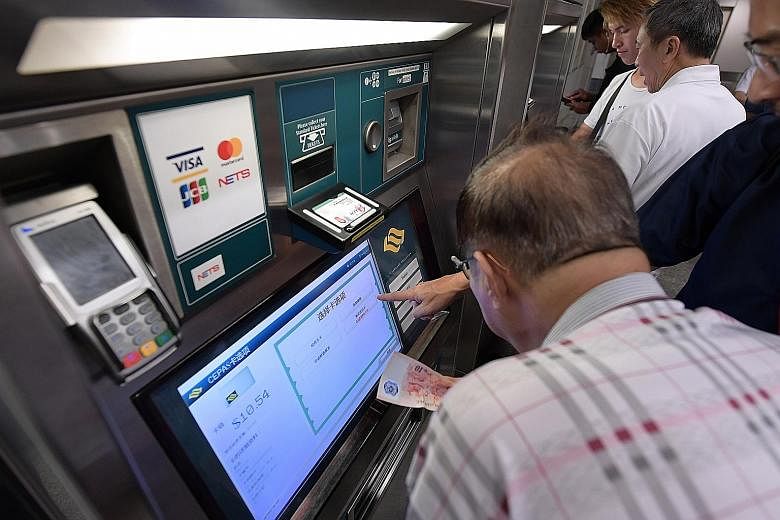Madam Heng Ah Leh walked to Rochor MRT station and, having memorised the exact buttons she needs to press on the ticketing machine, fed it a $10 note to top up her ez-link card.
But she will soon have to learn a new order of steps when Singapore's public transport system goes cashless.
From next year, passenger service centres at all train stations will no longer do cash top-ups for commuters.
By 2020, all ticketing machines at MRT stations will accept only cashless top-ups such as Nets, and debit and credit cards, said the Land Transport Authority (LTA) earlier this month.
Madam Heng, 75, a part-time hawker, lamented in Mandarin: "I am not highly educated and do not know how to use machines. Not allowing cash top-ups is definitely more troublesome.
"But young people today are very helpful, I might ask the person in front of me to help me top up and repay the person in cash."
-
69%
-
Proportion of Singaporeans who use cash as their preferred top-up method.
-
KEY STAGES
-
In line with Singapore's Smart Nation push, the public transport system is set to go fully cashless by 2020. The Land Transport Authority is set to do it in stages:
Sept 1, 2017
No cash top-ups at passenger service centres at 11 train stations (Admiralty, Bedok, Bukit Panjang, Buona Vista, Farrer Park, HarbourFront, Hougang, Lakeside, Pasir Ris, Serangoon and Yew Tee)
2018
Passenger service centres of other stations will no longer accept cash top-ups
2019
First cashless rail line (Thomson-East Coast Line)
2020
Self-service ticketing machines in stations and bus interchanges will accept only cashless top-ups. As for bus fares, only travel cards will be accepted.
Several senior citizens The Straits Times spoke to expressed similar concerns.
Retiree Theresa Choo, 82, said: "I am not confident of using cashless top-up methods but this measure will force us to learn. I am sure there will be people around to ask if we need help."
Figures from LTA show that 69 per cent of Singaporeans use cash as their preferred top-up method, implying that the impact of the new measure will extend to young students and working adults.
Ms Moh Su Jin, 21, a National University of Singapore student, said: "I use cash because it gives me some form of privacy. Our retail landscape does not really support cashless payments as some shops accept only cash. It is hard to navigate this landscape if only certain aspects are cash-free."
Mr Ang Hin Kee, deputy chairman of the Government Parliamentary Committee (GPC) for Transport, said his constituents have had a mixed response to the move to go cashless.
Some cited the additional cost of topping up their ez-link cards at convenience stores, and the lack of a universal card for multiple purposes such as transport, shopping and food.
"We shouldn't stop progress and forget about technological solutions because they (the elderly) won't come on board. Let's find a way to convince them to," he said.
Likewise, Dr Lily Neo, a member of the GPC for Social and Family Development, said some elderly people construct a barrier when tasked to learn new things.
"We will go all out to help and hand-hold them, letting them learn slowly until they realise it can be done," she said.
Acknowledging that many senior citizens and low-income families primarily use cash to make transactions, Mr Ang suggested directly transferring a partial value of rebates or vouchers to travel cards or PAssion cards that can be used for public transport.
Dr Neo suggested introducing a system for children similar to POSB smartwatches, where primary school pupils tap their watches on payment terminals.
She also proposed installing top-up stations at community centres and conducting classes at these centres to teach people how to adapt to the new system.
Ms Normala Manap, a senior associate director at the Centre for Ageing Research and Education at Duke-NUS Medical School, said efforts to engage and educate the elderly must remain a top priority.
"If we don't actively help seniors make this transition, we run the risk of them not getting onto transport and not being involved in society," she said.

